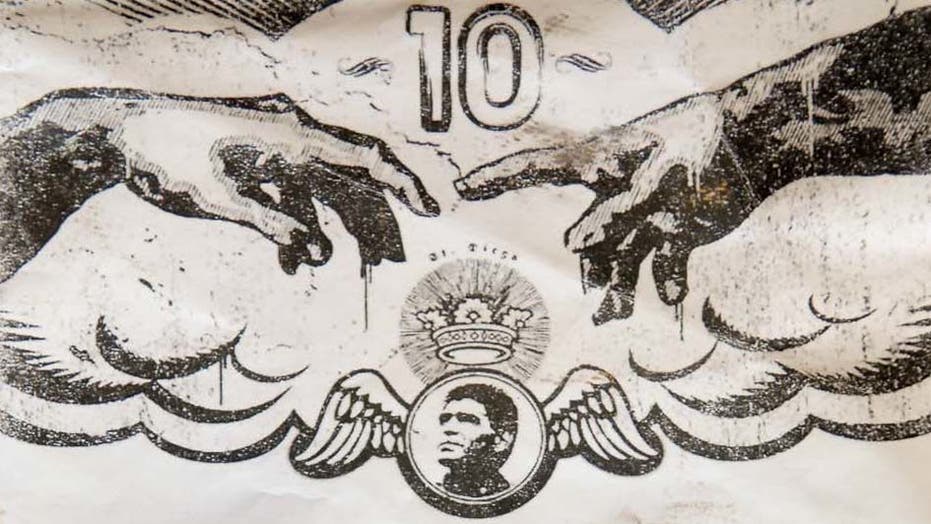For many in Argentina, soccer is almost a religion. For a few, it is exactly that.
Argentina is home to a religious movement called the Maradonian Church which venerates former soccer player Diego Armando Maradona as a god.
Founded by three men, Hernán Amez, Alejandro Verón and Héctor Campomar, in 2001 in the city of Rosario,186 miles from Buenos Aires, the Maradonian Church now claims 200,000 followers, enrolled online on the official Church website, from countries around the world like the U.S., Mexico, Spain, Afghanistan, Philippines, and Australia.
This unusual personality cult “was created to express and preach throughout the world our love to ‘El Diego’, who has given us so much and has worked miracles”, says Amez, one of the church's three founding spiritual leaders.
Maradona, popularly known as ‘El Diego’ and ‘El Pelusa’ (The Fuzz, due to his frizzy hair) to millions of sports fans, is reverently referred to within the church as D10S, a tetragrammaton resulting from mixing his playing number (10) with the Spanish word for God (Dios).
In church ceremonies, the Bible has been replaced by Maradona's autobiography, and special rites like Maradonian baptisms, weddings and masses are celebrated on special dates of special Maradonian significance. "October 30 is the date of birth of the greatest soccer player ever," explains Amez."And for ten years now, we have been celebrating the Maradonian Nativity”. (Maradona’s next birthday will mark the start of the year 51 AD --Anno Diego).
Another special date is June 22, when the Maradonians celebrate Easter to honor the match between Argentina and England in the 1986 FIFA World Cup in which Diego Maradona led his side to victory. On such high occasions, Amez, Verón and Campomar dress in white robes while holding up a soccer ball with a crown of hawthorns. Their prayer -- “Our Maradona who art in soccer field, hallowed by Thy left hand, Thy magic come, Thy goals will be remembered on earth as it is in Heaven. Give us this day your daily magical playing style, and forgive the British as we forgive the Neapolitan Mafia. And lead us not into off-side but deliver us from João Havellange and Pelé” -- is, of course, based on the Lord's Prayer.
In response to criticisms that the Maradonians are either making light of religion or are engaging in pagan worship, or both, Amez responds: “we neither try to interfere with religion nor to spark of controversial issues of any kind. Most of us are practicing Catholics. The Maradonian Church is about soccer. We thought up a unique movement that brought some fresh air to popular worship for soccer. If one calculates how many people attend mass, they are fewer than those who go to a soccer match. Perhaps the soccer players have become pagan gods. Why not?”
Those who were baptized into the church promise to obey ten Maradonian commandments, including: to let their middle name be Diego; to give their sons the name Diego; to love good soccer above all else; to honor Diego and preach about the miracles he has performed.
According to church faithful, Maradona's most transcendental miracle was to bring together all Argentineans to celebrate the “Hand of God” goal and “The Goal of the Century,” remembers Amez, pointing that at that time Argentina was just recovering from a brutal dictatorship and had just been defeated by the United Kingdom in the Falklands War.
"We all took to the streets and hugged each other leaving aside political, religious or gender issues. Nobody else had accomplished that before or since that day.”
While Maradona is their god, current Argentine soccer super-star Lionel Messi is “El Messias” (The Messiah).
“Messi is an upstanding person," says Amaz. "He was one of the first to take the Maradonian Church T-shirt to Barcelona (Spain) for distributing it among Maradona fans."
Besides Messi,‘Manu’ Ginóbili, member of the San Antonio Spurs in the National Basketball Association, also has a church membership card.
But famous or not, all are welcome, Amaz insists. “Any Maradona fan is welcome to this Church. We invite them to our facebook page (Iglesia Maradonian). And in the name of the Tota (Maradona’s mother’s name), and of Mr. Diego (his father’s name) and the fruit of their love (Maradona), the soccer god blesses you all”.
Yolanda Yebra is a freelance journalist in Buenos Aires, Argentina.
Follow us on twitter.com/foxnewslatino
Like us at facebook.com/foxnewslatino

